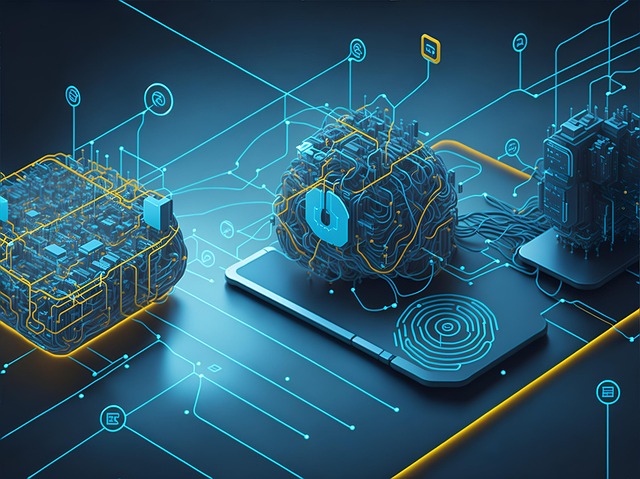AI is revolutionizing the automotive industry, offering significant potential for repair shops through predictive diagnostics and efficient inventory management. AI consulting firms guide businesses through this digital transformation, focusing on strategic implementation that includes task streamlining with computer vision, NLP, and machine learning. Gradual integration, employee training, and continuous performance monitoring ensure successful adoption. Advanced AI applications optimize parts identification, predict maintenance needs, and automate diagnostics, leading to faster, more accurate repairs and improved operational efficiency in the automotive aftermarket.
“Discover how AI is revolutionizing vehicle repair with our comprehensive guide. Explore the immense potential of Artificial Intelligence in enhancing repair shop operations through streamlined processes and data-driven insights. Learn about implementing AI consulting, from initial assessment to integration, to boost efficiency and profitability. Uncover future trends, including advanced AI applications that are reshaping the automotive aftermarket. Dive into this essential read for a strategic AI digital transformation strategy tailored for vehicle repair.”
- Understanding the Potential of AI in Vehicle Repair: Unlocking Operational Efficiency
- Implementing AI Consulting for Repair Shops: Step-by-Step Guide
- Future Trends: Advanced AI Applications in the Automotive Aftermarket
Understanding the Potential of AI in Vehicle Repair: Unlocking Operational Efficiency

Artificial Intelligence (AI) is revolutionizing the automotive industry, and its potential to transform vehicle repair processes is immense. By leveraging AI technologies, repair shops can unlock significant operational improvements, leading to increased efficiency and cost savings. AI consulting firms play a crucial role in helping these businesses navigate this digital shift.
Through machine learning algorithms, AI can analyze vast amounts of data from various sources—sensor readings, historical maintenance records, and manufacturer updates—to predict potential vehicle issues. This predictive capability enables repair shops to proactively address problems before they escalate, reducing the time spent on diagnostics and increasing overall shop productivity. Moreover, AI-driven systems can optimize inventory management, ensuring that spare parts are readily available when needed, minimizing stockouts, and maximizing revenue.
Implementing AI Consulting for Repair Shops: Step-by-Step Guide

Implementing AI Consulting for Operational Improvement in Repair Shops involves a strategic, step-by-step approach. Begin by assessing the current state of the shop’s operations, identifying pain points and areas where AI could provide the most significant impact. This might include tasks like parts identification, diagnostics, scheduling, or workforce management. Next, define clear objectives aligned with these identified areas, such as increasing efficiency, reducing costs, or improving customer satisfaction.
Once goals are established, select appropriate AI solutions tailored to the specific needs of the repair shop. Common applications include computer vision for parts recognition and damage assessment, natural language processing (NLP) for efficient communication with customers and staff, and machine learning algorithms to optimize scheduling and inventory management. Implement these tools gradually, providing adequate training for employees and fostering a culture of digital literacy. Regularly monitor performance metrics to evaluate the effectiveness of AI integration and make adjustments as needed.
Future Trends: Advanced AI Applications in the Automotive Aftermarket

The future of vehicle repair is poised for a significant shift with advanced AI applications, revolutionizing the automotive aftermarket. AI consulting firms are at the forefront of this transformation, offering strategies to optimize and streamline repair shop operations. By leveraging machine learning algorithms and natural language processing, these technologies can enhance parts identification, predict maintenance needs, and automate diagnostic processes, leading to faster and more accurate repairs.
Imagine a world where repair shops use AI-powered systems to instantly access vast databases of vehicle information, enabling technicians to make informed decisions. This technology can also enable predictive analytics, allowing shops to stay ahead of potential issues before they turn into costly repairs. As AI continues to evolve, its impact on the automotive industry will be profound, shaping a more efficient and intelligent aftermarket landscape.
The integration of AI digital transformation strategies offers a compelling path forward for vehicle repair shops to enhance their operational efficiency and stay competitive. By leveraging AI consulting, these businesses can streamline processes, improve diagnostic accuracy, and reduce costs. As the automotive industry evolves, embracing advanced AI applications will be key to capturing new opportunities in the aftermarket, ensuring long-term success and customer satisfaction.
